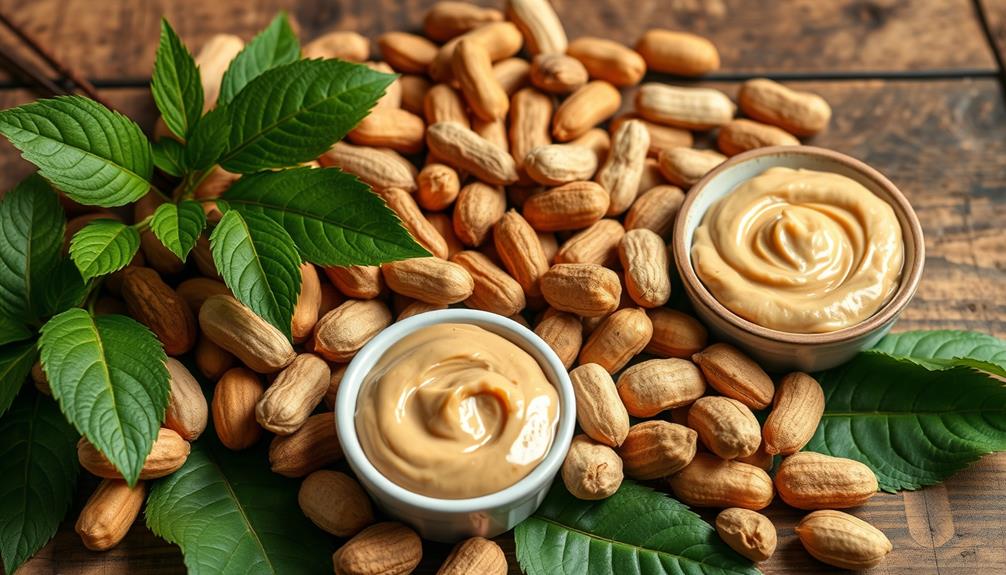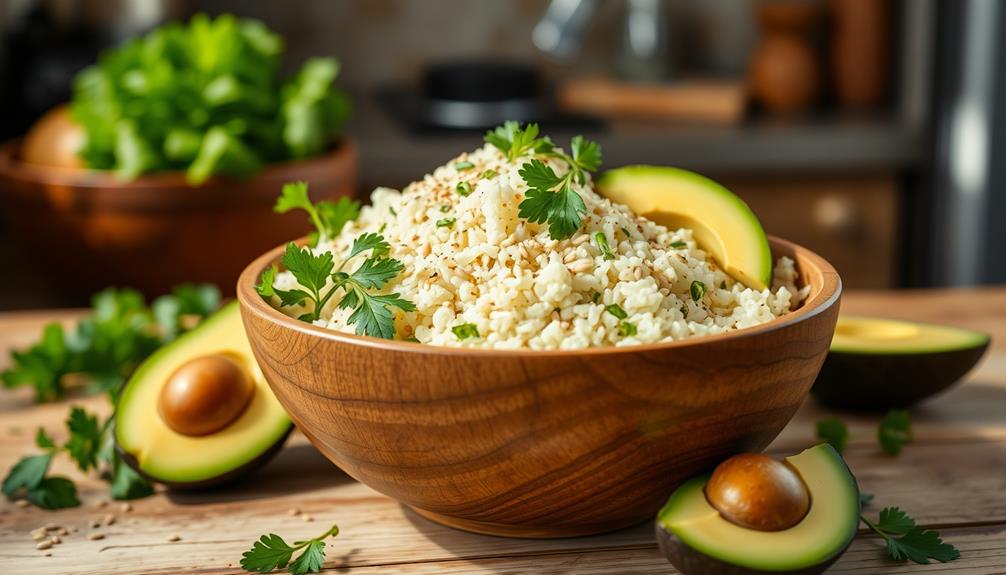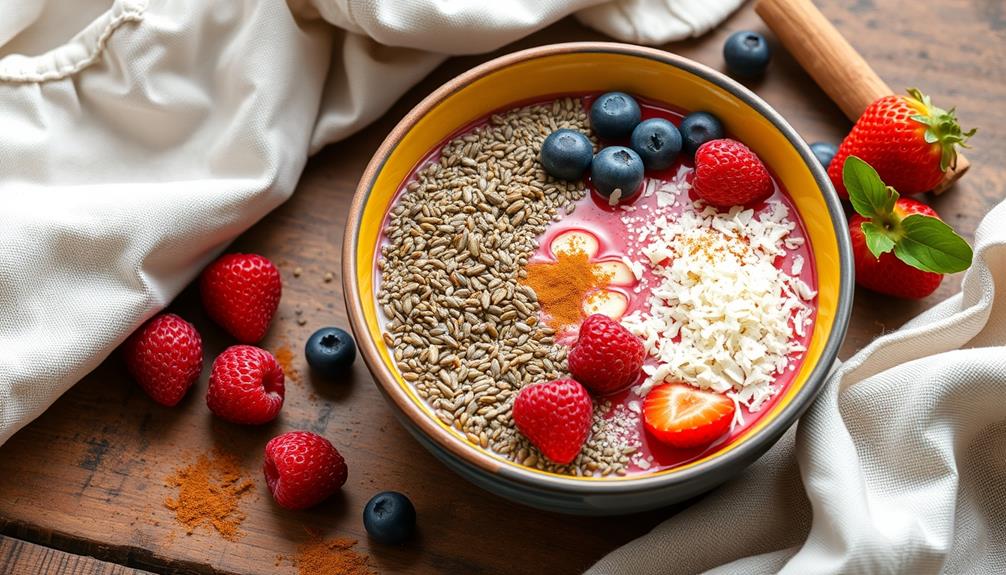You can eat peanuts on a keto diet, but moderation is key. A typical serving of 30g provides about 5-6g of net carbs, which can add up quickly against your daily limit of 50g. Boiled peanuts are a slightly better option as they have fewer carbs than honey-roasted varieties. Keep an eye on portion sizes to avoid going overboard, as this can stall ketosis. If you're looking for alternatives, nuts like macadamia and pecans have lower carb counts. Discovering the best choices can help you stay on track with your keto goals.
Key Takeaways
- Peanuts can be consumed on a keto diet but should be eaten in moderation due to their carb content.
- A typical serving of peanuts (30g) contains about 5-6g of net carbs, which can impact ketosis.
- Boiled peanuts are more keto-friendly than honey-roasted varieties, which have higher carb counts due to added sugars.
- To maintain ketosis, consider lower-carb nut alternatives like macadamia nuts or pecans.
- Tracking portion sizes and daily carb intake is crucial for successful keto adherence with peanuts.
Peanuts and Keto Compatibility
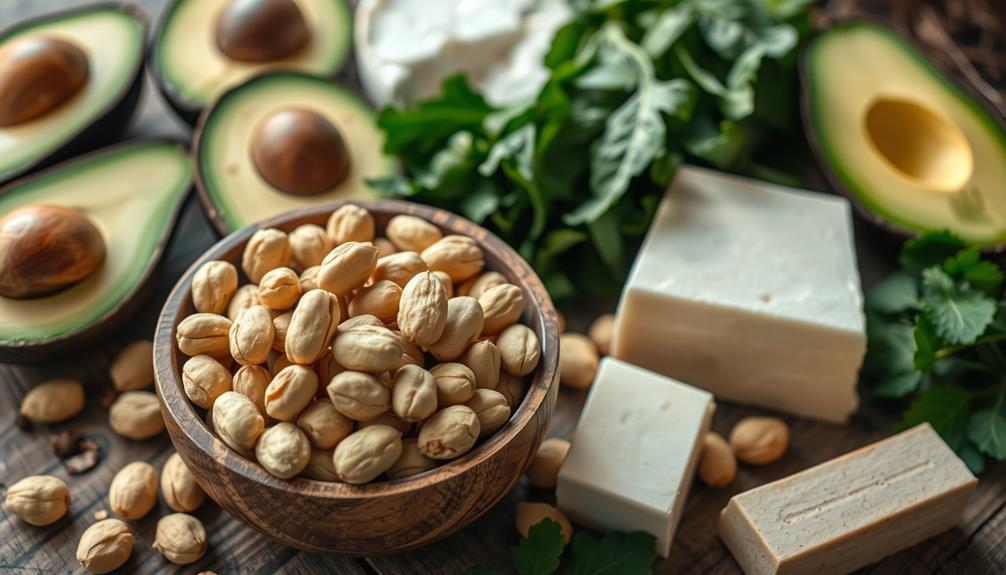
While you can enjoy peanuts on a keto diet, it's important to be mindful of their carb content. Peanuts contain about 7.63 grams of carbohydrates per 100 grams, which can quickly eat into your daily carb limit, especially if you're following a strict keto approach. A typical serving of dry roasted peanuts, around 30 grams, has nearly 5 grams of carbs.
If you're aiming for weight loss, portion control becomes essential. Additionally, incorporating a variety of low-carb snacks can enhance your keto experience and prevent cravings. For more dietary tips, check out foods beneficial for managing gout symptoms.
In moderation, peanuts can fit into your keto lifestyle, but overindulgence may hinder your progress. For example, boiled peanuts are a more keto-friendly choice, containing roughly 6 grams of carbs per serving. In contrast, honey roasted peanuts can spike your carb intake with up to 12 grams.
When comparing peanuts to nuts like macadamia nuts, which are lower in carbs, you'll want to be cautious. Keeping an eye on the nutritional content of peanuts guarantees you stay within your daily carb limit.
Nutritional Profile of Peanuts
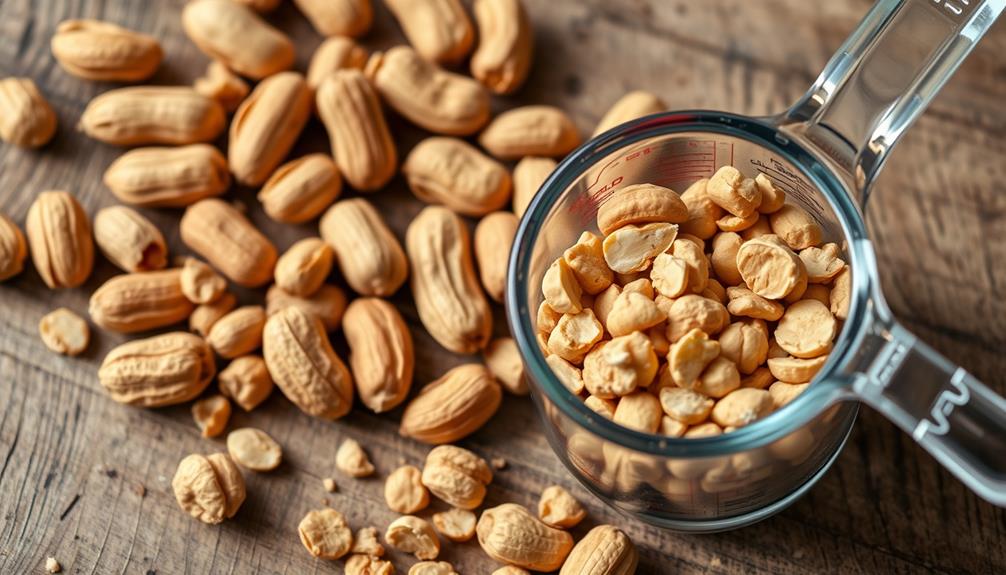
Peanuts are a nutrient-dense snack that packs a punch regarding calories and essential nutrients. In a 100g serving, you'll find approximately 567 calories, with a whopping 49.24 grams of healthy fats and 25.8 grams of protein. This makes peanuts incredibly calorie-dense but also a great source of healthy fats and protein, which are essential for a low-carb diet.
Additionally, peanuts are rich in antioxidants, which can be beneficial for overall health, similar to the benefits of Cranberry Juice Consumption.
When it comes to carb content, peanuts provide about 7.63 grams of carbohydrates per 100 grams. This can contribute notably to your daily carb limits, especially if you're following a strict keto diet. It's important to keep the nutritional benefits in mind, as peanuts are also rich in essential nutrients like potassium (705mg), magnesium (168mg), and Vitamin E (8.33mg), which support your overall health.
However, be mindful of how you prepare peanuts. Different preparations can have varying carb contents; for example, boiled peanuts contain about 6 grams of carbs per serving, while honey-roasted peanuts can spike that number to around 12 grams due to added sugars.
Impact on Ketosis
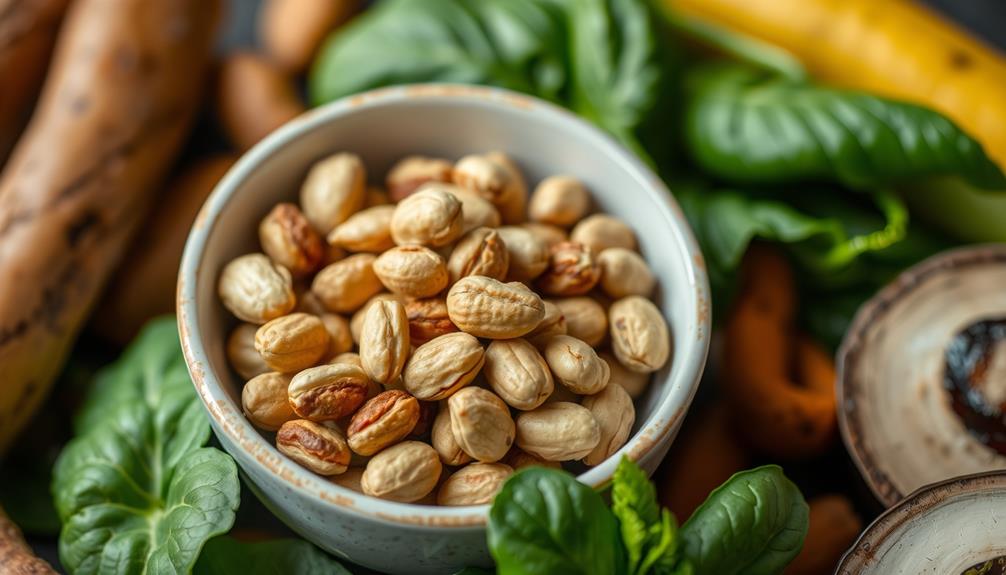
When you're on a keto diet, it's essential to keep an eye on the carbohydrates you consume, and peanuts can contribute more than you might think.
It's important to understand the concept of budgeting your carb intake, as eating just a small serving can take up a significant chunk of your daily carb allowance, which could stall ketone production.
To stay in ketosis and achieve your weight loss goals, moderation is key—so consider balancing your peanut intake with lower-carb nut options.
Carbohydrate Contribution Consideration
Maneuvering the carbohydrate contribution of peanuts is vital for anyone on a keto diet. Peanuts contain approximately 7.63 grams of carbs per 100 grams, which can considerably impact your daily carb intake, especially on a strict keto diet where you typically aim for under 20 grams of carbs. A typical serving of peanuts, about 30 grams, delivers around 5 grams of carbs, taking up a substantial part of your daily allowance.
Additionally, understanding the importance of investment strategies in precious metals can be beneficial when looking at alternative financial avenues while managing your diet.
While peanuts offer healthy fats and protein, their carb content places them in a gray area for strict keto adherence. This necessitates careful portion control to avoid exceeding your recommended carb intake. If you're not vigilant, consuming larger quantities of peanuts can quickly lead to a carb overload, potentially halting ketosis.
For those seeking alternatives, consider keto-friendly nuts like macadamia nuts or pecans, which are lower in carbs. These options can help you maintain your carb limits while still enjoying your snacks.
Ultimately, being mindful of the carbohydrate contribution from peanuts is vital to keeping your keto journey on track.
Ketone Production Impact
Maintaining ketone production is vital for those pursuing a keto diet, and your choice of snacks plays a significant role in this process. Peanuts can be a tempting option, but you need to be mindful of their carb content. A typical 30g serving of peanuts contains nearly 5g of carbs, which can quickly eat into your daily carb limit, especially if you're aiming for ketosis.
Incorporating a variety of Gold IRAs offer potential for long-term capital appreciation can also enhance your financial strategy as you focus on your health. To guarantee you're not disrupting your keto journey, consider the following:
- Track your peanut intake carefully.
- Stick to a moderate intake to avoid excessive carbs.
- Be aware that overindulgence can halt ketone production.
- Remember the health benefits of peanuts when consumed appropriately.
Your body's ability to produce ketones relies on maintaining a low carb intake. So, while peanuts aren't strictly forbidden on a keto diet, it's important to monitor how much you consume. Excessive amounts can impede your metabolic state, making it harder to reach and maintain ketosis.
Balancing the enjoyment of peanuts with their carb content can help you stay on track with your keto goals.
Moderation for Success
To succeed on a keto diet, moderation is key, especially when it comes to snacks like peanuts. While peanuts are a good source of healthy fats, their carb content can quickly add up. A typical serving size of 30 grams contributes around 5 grams of net carbs, which is significant when you're aiming to keep your daily carb intake below 20 grams.
Here's a quick breakdown of how peanuts compare to other nuts:
| Nut Type | Net Carbs (per 30g) |
|---|---|
| Peanuts | 5g |
| Macadamia | 1g |
| Pecans | 1g |
| Almonds | 2g |
| Walnuts | 2g |
If you overindulge in peanuts, you risk exceeding your daily carb intake, which can halt ketosis and hinder your weight loss efforts. To maintain successful ketosis, be mindful of your portion sizes and aim for a balanced approach. Stick to moderation with peanuts and choose lower-carb nuts more often to stay on track with your keto diet.
Portion Control Guidelines

When it comes to peanuts on a keto diet, sticking to the recommended serving size of 1 ounce is key. Monitoring your daily intake can help you stay within your carb limits and enjoy this snack without derailing your progress.
Additionally, it's important to assess your overall dietary goals, similar to how one evaluates risk management strategies for Bitcoin IRAs to guarantee you remain on track.
Consider pre-portioning your peanuts to make it easier to track and control your servings.
Recommended Serving Size
For anyone on a keto diet, understanding the recommended serving size of peanuts is essential to stay within your carb limits. The typical serving size is one ounce (about 28 grams), which contains approximately 6 grams of net carbs.
If you consume more than this, you risk exceeding the daily carb limit, usually around 20-50 grams for a strict ketogenic diet. It's also important to reflect on other high-fat investment options for your overall diet health, much like how you'd explore trusted precious metal IRAs for financial health.
Here are some portion control guidelines to help you enjoy peanuts responsibly:
- Stick to one ounce of peanuts to manage your carb intake.
- Remember that one ounce contains about 164 calories.
- Limit peanut butter to one serving, roughly 2 tablespoons, to keep carbs in check.
- Be mindful of portion sizes when snacking on these NUTS, as moderation is key.
Monitoring Daily Intake
Monitoring your daily intake of peanuts is essential for staying on track with your keto diet. Limit your servings to about 1 ounce (28 grams) to keep your carbohydrate intake below 50 grams daily. A typical serving of peanuts contains 5-8 grams of carbs, which can quickly add up, impacting your daily limits. To effectively manage your carb intake, tracking your food consumption is key.
Consider using a food diary or app to monitor your peanuts alongside other foods. Pre-portioning your snacks can help you avoid mindless eating and guarantee you adhere to your carbohydrate goals.
Here's a simple guide to help you with portion control:
| Food Item | Carbohydrates (grams) per Serving |
|---|---|
| Peanuts (1 oz) | 5-8 |
| Peanut Butter (1 tbsp) | 3-4 |
| Daily Limit (max) | 50 |
Peanut Butter on Keto
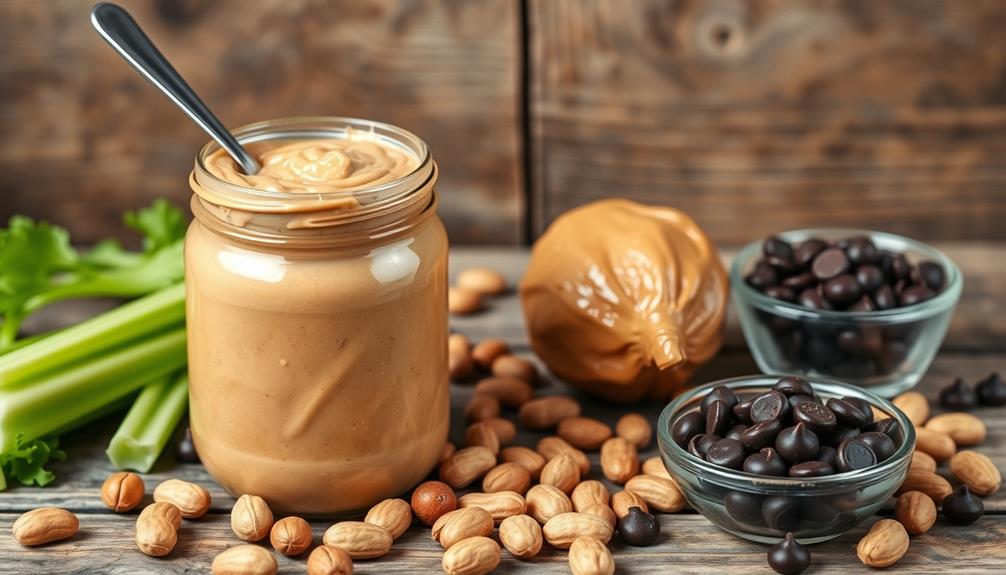
Peanut butter can be a delicious and satisfying addition to your keto diet, but choosing the right kind is essential. You'll want to steer clear of options loaded with added sugars and preservatives, which can spike your carb count. A typical serving of peanut butter (about 2 tablespoons) contains around 6-8 grams of carbs, which could take up a significant portion of your daily limit if you're following a strict keto diet.
Additionally, incorporating healthy fats from sources like essential oils for hair growth can further enhance your overall diet.
To enjoy peanut butter while keeping your carbs in check, consider these tips:
- Opt for natural peanut butter, which usually has just peanuts and salt.
- Remember to practice moderation; limit yourself to one serving per day due to its caloric density.
- Keep an eye on your personal tolerance, as some may experience inflammation from peanuts.
- Balance your intake of healthy fats with other keto-friendly foods.
Alternative Low-Carb Nuts
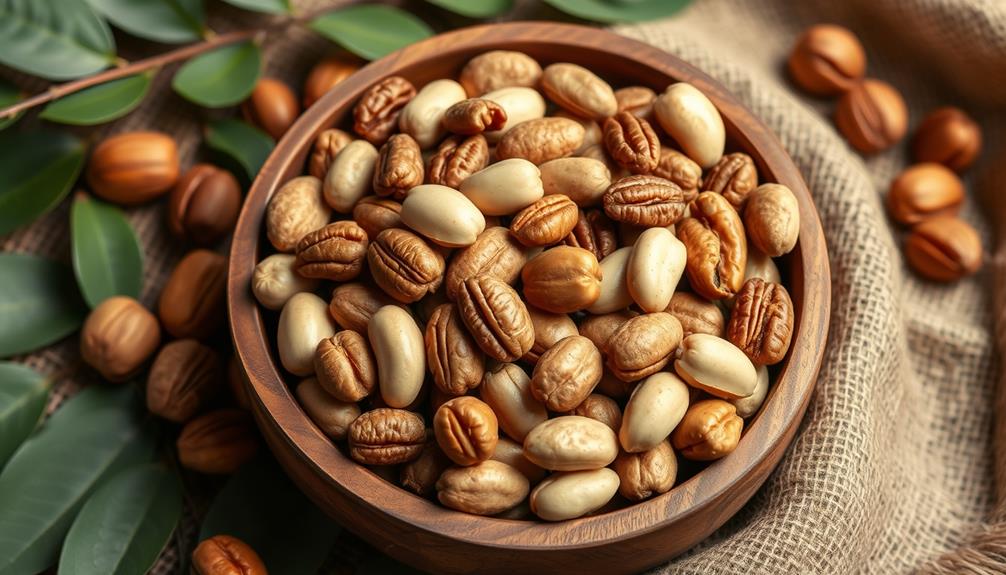
When you're looking to switch things up on your keto diet, consider incorporating alternative low-carb nuts that can boost your nutrient intake without causing a carb overload. These nuts can also provide essential fatty acids and antioxidants, contributing to overall health and well-being, as highlighted in lifestyle for longevity.
Almonds are a fantastic option, containing only 2 grams of net carbs per ounce. These nuts are rich in healthy fats, fiber, and vitamin E, making them a good choice for your snacking needs.
Macadamia nuts are another excellent addition, offering around 2 grams of net carbs per ounce, along with high levels of monounsaturated fats that can promote satiety and support heart health.
If you're searching for the lowest carb option, pecans stand out with just 1 gram of net carbs per ounce. Their high antioxidant content also makes them beneficial for your overall health.
Don't overlook walnuts either; they provide about 2 grams of net carbs per ounce and are a great source of omega-3 fatty acids, which are key for heart health and reducing inflammation.
Finally, Brazil nuts contain less than 4 grams of total carbs per ounce and provide essential selenium, supporting immune function and thyroid health.
Enjoy these nuts in moderation to enhance your keto diet!
Frequently Asked Questions
How Many Peanuts Can You Eat on Keto?
You can eat about 1 ounce of peanuts on a keto diet, which is roughly 28 grams. Just remember, moderation's key to stay within your carb limits and maintain ketosis effectively.
Why Avoid Peanuts on Keto Diet?
In the intricate dance of dietary choices, you might want to sidestep peanuts. Their hidden carbs can trip you up, and potential inflammation could dim the vibrant glow of your keto journey. Stay vigilant!
What Nuts Can I Eat on Keto?
You can enjoy nuts like pecans, macadamia nuts, hazelnuts, almonds, and walnuts on a keto diet. They're low in net carbs and packed with healthy fats, making them perfect for your snacking needs.
What Are the Lowest Carb Nuts?
When it comes to low-carb nuts, think of pecans as your hidden treasure, boasting just 1 gram of net carbs per ounce. Macadamia nuts and almonds follow closely behind, making them ideal for your keto journey.
Conclusion
So, can you eat peanuts on a keto diet? Absolutely! As long as you keep an eye on your portion sizes, peanuts can fit into your low-carb lifestyle. Their nutritional benefits and satisfying crunch make them a tasty snack. Just remember, moderation is key—too many can kick you out of ketosis. And if you're ever in doubt, you can always explore other low-carb nut options. Enjoy your snacks and stay on track with your keto goals!
